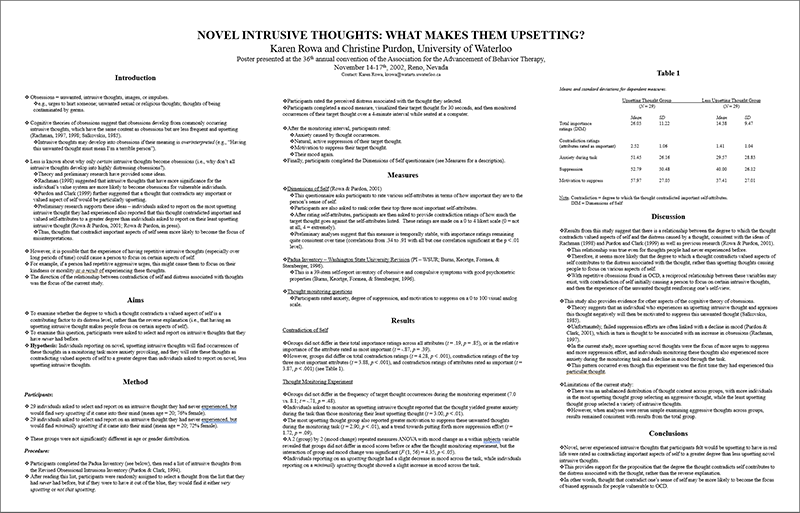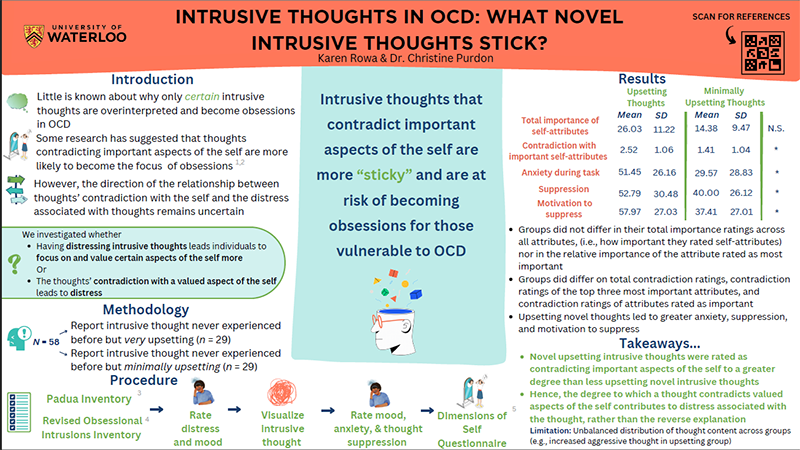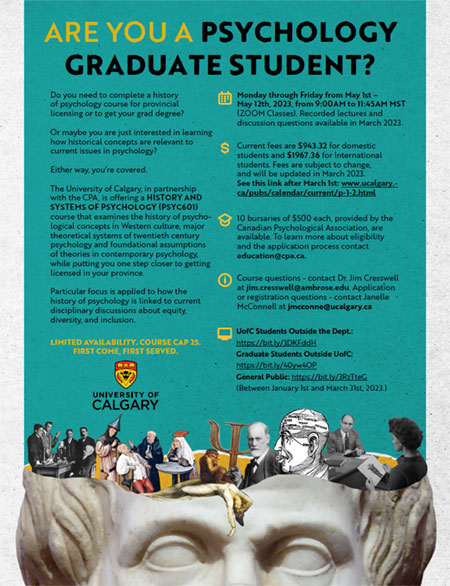Part of the Student Section’s mission is to provide psychology students with valuable resources regarding their education, training and career development.
Here is a growing collection of information provided by the Section Executive that may be useful to students. Browse the Section webpages for more information relevant to psychology students. If there is a topic that that you would like information to be available about, please contact the Section Chair.
NOUVEAU Qu’est-ce qui rend une affiche scientifique attrayante en psychologie?
Un guide créé par la Dre Karen Rowa, la Dre Nina Josefowitz, et les étudiantes de McMaster Sydney Parkinson, Arij Alarachi et Rei Jamali-far
Présenter le fruit de ses recherches lors d’un congrès est un incontournable de la diffusion des connaissances. Deux des autrices (KR et NJ) ont eu le privilège d’être juges de présentations par affiches dans différents contextes au cours de leur carrière de plusieurs décennies. Nous avons récemment agi comme juges dans le cadre d’un congrès national. Assises autour d’un café, nous avons discuté de ce qui fait qu’une affiche est convaincante, intéressante et bien présentée. Nous nous sommes rendu compte que les directives existantes ne rendaient pas pleinement compte de ce qui nous attire vers certaines affiches plutôt que d’autres. Nous avons décidé de créer un exemple qui, nous l’espérons, fournira quelques indications aux personnes intéressées. Cet article présente l’exercice et nos réflexions.
Une chose était claire pour l’équipe : nous savions ce qui caractérise une affiche non convaincante ou mal communiquée – une affiche que nous aurions probablement ignorée lors d’une séance d’affichage très animée! Par chance, la première autrice (KR) possédait quelques exemples du début de sa carrière qui correspondaient à ces critères. Lorsqu’elle a conçu ses premières affiches, elle cherchait à y inclure toutes les informations, sans se préoccuper de la manière dont les données étaient présentées. L’affiche ci-dessous, qui date de cette époque, manque d’attrait visuel, est trop chargée en texte et ne guide pas les lecteurs vers les aspects importants de l’étude ou des conclusions. Comprenez-nous bien : l’étude reste intéressante, mais sa présentation pourrait être améliorée. Pour établir une comparaison, trois autrices (SP, AA et RJ) ont utilisé un logiciel récent et ont actualisé l’affiche pour la rendre plus accessible et susceptible d’attirer l’attention des participants au congrès lorsqu’ils déambulent dans les multiples rangées d’affiches intéressantes présentées.
Lorsqu’on compare les deux versions, on remarque des différences importantes dans la version actualisée.
- La quantité de texte est réduite, ce qui permet aux lecteurs de mieux assimiler le contenu dans un délai raisonnable, tout en conservant les points essentiels de chaque section.
- En réduisant la quantité de texte, la taille de la police peut être augmentée, ce qui améliore la lisibilité. Il est important de pouvoir lire facilement au moins les titres à une distance d’au moins un mètre.
- Le modèle utilisé est coloré et attrayant. Certains chercheurs hésiteront à utiliser quelque chose d’aussi audacieux, un point de vue valable et personnel. Cependant, le principe de base consiste à dire qu’un peu de couleur et de motifs valent mieux que rien du tout.
- Grâce aux codes QR, il est maintenant possible d’accéder facilement à des informations importantes, mais difficiles à intégrer. Les personnes intéressées peuvent ainsi obtenir plus de détails sur les analyses, les mesures utilisées ou les références en utilisant les codes QR.
- Les images remplacent le texte à certains endroits, pour varier les supports visuels et transmettre plus efficacement les concepts.
- La variation des couleurs et de la taille des caractères attire l’attention des lecteurs sur certaines informations.
- Le message clé à retenir est mis en évidence au centre de l’affiche, ce qui permet aux lecteurs de le comprendre facilement et, espérons-le, de s’en souvenir!
Nous espérons que cette comparaison visuelle sera utile à plusieurs, en particulier les étudiantes et étudiants qui débutent dans le domaine de la communication scientifique.

Affiche originale (PDF)

Affiche mise à jour (PDF)
ARE YOU A PSYCHOLOGY GRADUATE STUDENT?

Are you a PSYCHOLOGY GRADUATE STUDENT that needs to complete a history of psychology course for provincial licensing or to get your grad degree? Or maybe you are just interested in learning how historical concepts are relevant to current issues in psychology?
Either way, you’re covered.
The University of Calgary, in partnership with CPA, is offering a HISTORY AND SYSTEMS OF PSYCHOLOGY (PSYC601) course that examines the history of psychological concepts in Western culture, major theoretical systems of twentieth century psychology and foundational assumptions of theories in contemporary psychology while putting you one step closer to getting licensed in your province. Particular focus is applied to how the history of psychology is linked to current disciplinary discussions about equity, diversity, and inclusion.
Information and registration available through links in poster, UofC-CPA History Course Ad – Feb 9 2023 Final.pdf.
New Mental Health Resource of Sexual Minority Men: Our Mental Health Matters Too
 The Goodhead Website is a a research-based mental health resource for sexual minority men. This knowledge translation project was funded by a Canadian Institutes of Health Research (CIHR) Community Support Grant from the Institute of Gender and Health, with additional support from Dr. Daniel Grace, the Canada Research Chair in Sexual and Gender Minority Health at the University of Toronto. This website was created as a tool to help gay, bisexual, queer and other guys into guys learn more about the social factors affecting their mental health. It offers great navigation tips on how to access and to evaluate mental health care supports in Ontario and functions as well as an advocacy tool to expand mental health services for sexual minorities. The website also serves as resource for health service providers working with LGBTQIA2+ communities.
The Goodhead Website is a a research-based mental health resource for sexual minority men. This knowledge translation project was funded by a Canadian Institutes of Health Research (CIHR) Community Support Grant from the Institute of Gender and Health, with additional support from Dr. Daniel Grace, the Canada Research Chair in Sexual and Gender Minority Health at the University of Toronto. This website was created as a tool to help gay, bisexual, queer and other guys into guys learn more about the social factors affecting their mental health. It offers great navigation tips on how to access and to evaluate mental health care supports in Ontario and functions as well as an advocacy tool to expand mental health services for sexual minorities. The website also serves as resource for health service providers working with LGBTQIA2+ communities.
Link to Website: www.goodhead.ca
Student Internships
The CPA is pleased to post a link to the e-book “Match Made on Earth, 2nd Edition”. It is edited by Dr. Rebecca Pillai Riddell, CPsych (York University) and Dr. Melanie Badali, RPsych (North Shore Stress and Anxiety Clinic). This workbook has been reviewed and financially supported by the Canadian Council for Professional Psychology Programs (CCPPP). Copyright of the workbook, however, rests with its editors. Because the workbook is not a CPA document, it has not been translated into French. The new manual is available free of charge: https://ccppp.wildapricot.org/news/8761509
General Student Resources
- A Collection of Resources in Honour of Psychology Month.
- Workshop presented at the CPA Annual Convention 2010 on career options in psychology: “Where do Psychologists Fit?” English / French
- Workshop presented at the CPA Annual Convention 2013 on applying to graduate school: “Applying to Graduate School in Psychology: A Survival Guide for Students”
- Links to articles published in Psynopsis that may be of interest to students.
- A listing of awards available from CPA for students.
Applying To Canadian Graduate School
Be sure to read the “Psychology Works” Fact Sheet: Applying To Canadian Graduate Schools
Planning a Career in Psychology
Are you planning a career in psychology? If yes, be sure to download Planning a Career in Psychology: A Canadian Perspective for University Bound and Beginning University Students.
Resources for Campus Representatives
Print this poster and display it in your department to attract new CPA student members. French version.
Conduct a presentation (powerpoint presentation and notes) to undergraduate students on Applying to Graduate School. French version (powerpoint presentation and notes).
Ontario Psychological Association Early Career Psychologist Project
This document is a practical organizational guide for Psychological Associations about how to develop and maintain the membership and involvement of early career psychologists in their Association. It is a compilation of the efforts and strategies of the Early Career Psychologist Taskforce in the Ontario Psychological Association (OPA). Many of the ideas and strategies can be broadly applied and modified to meet the needs of both small and large Associations. Click here to download the guide or contact the OPA for more information.
Sites of Interest
Below is a collection of other websites which you may find useful. If you have or know of a website that could be added to this list, please contact the Communcations Officer.
- PsychologyDegreeOnline.net. provides prospective and current students with tons of information about all the different psychology programs that they can choose from. The site also offers an array of resources such as specializations, scholarships, certifications, careers, as well as the different degree options.
- Affordable Colleges Online
- American Psychological Association
- Association of Universities and Colleges of Canada
- Association of Psychology Postdoctoral and Internships Centers
- Peterson’s Education Portal–College, Graduate Program, Test preparation, SAT, Scholarship, Financial Aid, Distance Learning
- Canadian Scholarship Database
- Canadian Institutes of Health Research
- Careers in Psychology
- Journal of Interpersonal Relations, Intergroup Relations and Identity (JIRIRI). This project is a student initiative that offers a unique opportunity for undergraduate students to fully experience the publication process.
- Natural Sciences and Engineering Research Council of Canada
- Psychology Career Center: A Psychology Career Guide
- Social Sciences and Humanities Research Council of Canada
- Simply Psychology
- Online Degrees
- Universities Canada
Summaries of results of two recent surveys on interprofessional education are available:
- Students’ Perspectives on Interprofessional Education in Canadian Graduate Psychology Programs
- Lee, C.M., Schneider, B.H., Bellefontaine, S., Davidson, S., Robertson, C. (2012). Interprofessional collaboration: A Survey of Canadian psychologists and psychiatrists. Canadian Psychology, 53 (3), 159-164. Note: CPA members can download this article by logging into the CPA’s Members Only Area.
